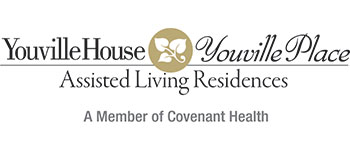Intergenerational Relationships Matter
Summary
At Youville House in Cambridge, residents are partnering with students from the Cambridge Rindge and Latin School for an Intergenerational Portrait Art project this semester. Intergenerational relationships strengthen communities and broaden our perspectives.

Elizabeth Menges, an art teacher at the Cambridge Rindge & Latin School, meets with residents David Fitzgerald and Maggie Domini during the Intergenerational Portrait Art Project at Youville House.
When was the last time you had a meaningful interaction with someone significantly younger or older than yourself? Chances are, you have fond childhood memories of visits with grandparents and other older relatives, as well as more recent visits with your own grandchildren. But if you are like most people, these fleeting moments of family togetherness are probably the extent of your exposure to people from different generations.
Intergenerational relationships are becoming increasingly important in our society. As life expectancy increases and more baby boomers retire, senior care services are making up a growing slice of the economy. In these settings, there is often an initial lack of comprehension between younger and older generations that can seem like a hurdle. With a little time and dialogue, the difference are revealed to be superficial. This is due to the much broader pattern of age segregation that prevails throughout our culture.
According to Alice Schlegel, an anthropologist from the University of Arizona, age segregation is “related to features of antisocial behavior and to socialization for competitiveness and aggressiveness.” It is not good for society, but it has become a fact of life.
Why Intergenerational Relationships Matter
One obvious reason that younger and older people today have trouble communicating is that they have not had many opportunities to interact. As families move away from each other and spread out across the country, the traditional relationship between grandparents and grandchildren becomes less central than it once was.
Assisted living residences bridge the generation gap by providing older residents and younger staff with daily exposure to one another. Daily programs provide additional opportunities to bring younger generations into community with older adults. Outside of senior housing, programs are emerging within the non-profit and educational sectors to bring young and old together across the country.
Temple University has an Intergenerational Center, whose mission is to “mobilize people of all ages to support one another and address critical social issues in their communities.” Many elementary schools place senior volunteers with students in need of one-on-one tutoring.
Studies suggests that everyone benefits from intergenerational exposure. Children develop confidence, empathy and other social skills through their interactions with older adults. Research published in the Journal of Urban Health found that a group of seniors who regularly volunteered with children experienced improvements in memory, balance, and were more likely to maintain a healthy weight. These benefits were likely due to the increase in physical activity and mental stimulation that resulted from a routine of volunteering.
 At Youville House in Cambridge, residents are partnering with students from the Cambridge Rindge and Latin School on an Intergenerational Portrait Art project this semester. The students are currently interviewing and sketching residents in preparation for full scale portraits. At the end of the semester, students and residents will unveil the final portraits in a community art exhibit at Youville House. As in semesters past, the partnership between Youville and Rindge provides valuable intergenerational exposure for both residents and students.
At Youville House in Cambridge, residents are partnering with students from the Cambridge Rindge and Latin School on an Intergenerational Portrait Art project this semester. The students are currently interviewing and sketching residents in preparation for full scale portraits. At the end of the semester, students and residents will unveil the final portraits in a community art exhibit at Youville House. As in semesters past, the partnership between Youville and Rindge provides valuable intergenerational exposure for both residents and students.
For more information about programs and events at Youville, please contact Yanira Burgos at 617.491.1234 or email yaniraburgos@youvillehouse.org.



